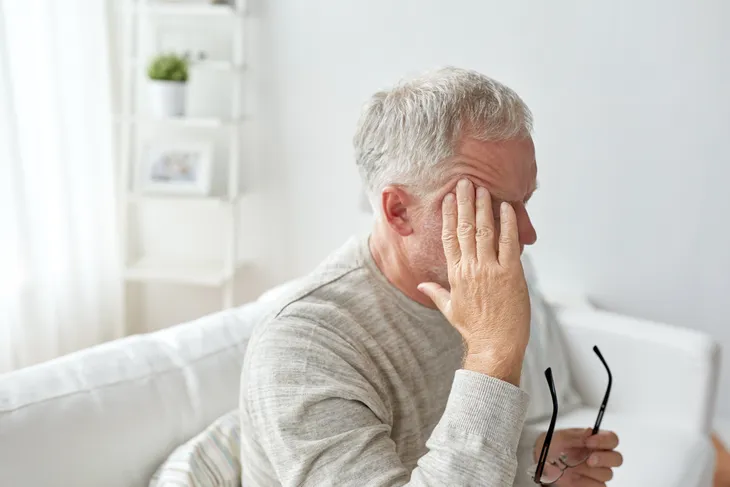The human body is made up of approximately 70-percent water. So, it makes sense that fluids are vital for the majority of our bodily functions—protecting our joints, maintaining organ function, transporting oxygen to cells, and sustaining body temperature. It also makes sense that the body can become dehydrated fairly quickly due to excess perspiration, hot weather, sun exposure, and lack of fluids throughout the day.
However, if you’re active or if you sweat excessively, replenishing water levels regularly throughout the day is even more important to prevent dehydration. Here are 16 telltale signs (in no particular order) that your body is experiencing dangerous dehydration…
Want diet & nutrition content delivered straight to your inbox? Sign up for our exclusive diet & nutrition newsletter!
1. Fatigue Sets In
When the body suffers from chronic dehydration, blood flow and blood pressure drop due to a lack of water and oxygen in the blood. Basically, dehydration results when the body loses more water than it takes in. This causes the muscle and nerve dysfunction that is due to profuse sweating after exertion. “The defense mechanism of the body in the face of dehydration is to shut down blood supply to ‘non-vital’ organs,” says Robert Korn, MD, medical director of GoHealth Urgent Care to Self. This causes a person to start feeling sluggish as their body begins to operate at a slower pace.
If you have the stomach flu and are suffering from water loss (due to a combination of vomiting and/or diarrhea), you will often feel fatigued. This is why doctors will recommend rest along with plenty of fluids, such as water, juice, and herbal teas, to replenish lost water levels.

2. Urine Appears Dark Yellow
Concentrated, dark yellow urine is one of the first signs of dehydration. This typically occurs when blood pressure levels fall and the kidneys attempt to store water instead of expel it from the body. Dark urine refers to urine that has a deeper than normal color, although some dark urine is brown or deep yellow for some individuals. For others, it can appear maroon versus it’s normal golden straw to yellow color. According to Christopher McStay, MD, Chief of Clinical Operations at UCHealth University of Colorado Hospital, dehydration can also cause the urine to develop a strange smell.
Keep in mind that urine can change in color due a variety of reasons, with dehydration being one of the most common. However, urine can be discolored due to medications, certain foods (i.e., beets), or as a side effect of health conditions (i.e., liver disease). If your urine is still discolored after you hydrate and for no other apparent reason, talk to your doctor.
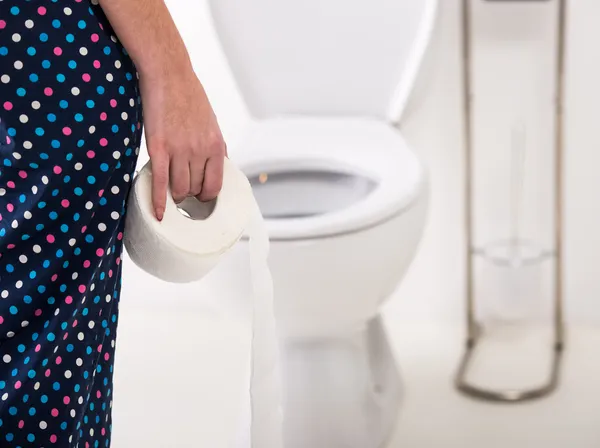
3. Sudden Lightheadedness
When your blood pressure drops due to dehydration, dizziness often follows if you stand up too quickly. This type of dehydration-related condition is referred to as orthostatic hypotension by medical professionals. Many people wouldn’t consider a lack of water as potentially dangerous. However, if the body is severely robbed of water, extreme confusion, and dizziness can occur. Dehydrated infants and children may become confused, fussy, and irritable as the blood pressure plunges.
As dehydration sets in, the heartbeat and breathing will become rapid. You may feel like you can’t catch your breath, and you may feel fatigued and faint. In severe cases of dehydration, the patient may appear delirious and even lose consciousness.

4. Heart Rate Increases
Dehydration often causes plummeting electrolyte levels, which will lead to an increased heart rate and/or heart palpitations. As blood pressure drops, breathing and heart rate will quicken, indicating potential dehydration.
If you suspect you or someone you know is dehydrated, you can take their pulse (heart rate). Take it for 15 seconds and multiply your result by 4, with normal being 60-100 beats/minute. Inadequate fluid in the blood will cause dehydration, increasing the heart rate, and causing dizziness as there is inadequate blood flow to the brain. An elevated heart rate check can be a good determinant of dehydration severity.
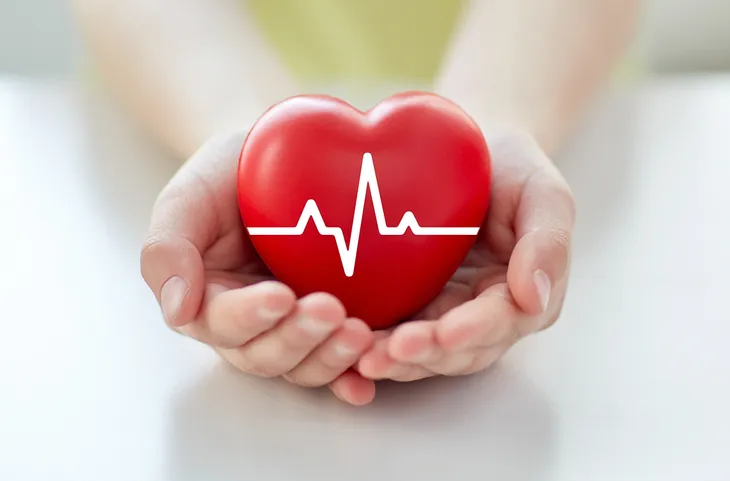
5. You Overheat
Fluid levels within the body keep our temperatures regulated so we don’t become dehydrated and overheat—or even worse suffer dangerous heatstroke! However, thirst can send mixed signals when the body needs water. If your body needs fluid, it may often register as hunger (as opposed to thirst) causing you to believe you need to eat when you really need to increase your liquid intake.
Obviously, if you are overheated due to physical exertion, you may become dehydrated due to fluid loss due to excessive perspiration. You can also suffer fluid loss from being in a hot environment. That’s why it’s important to bring water along with you if you plan to work out in a hot environment (i.e., hot yoga) or if you are outdoors in the heat and sun, even for brief periods of time.
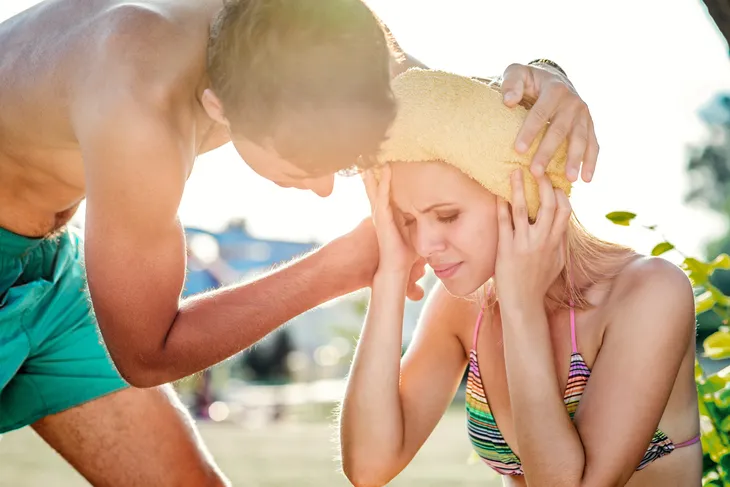
6. Muscles Cramp
Hydration, or more so electrolyte balance, is vital for muscle contraction, so when sodium and potassium stores are low, it can cause painful muscle spasms. A muscle cramp or spasm will occur when a forcibly (or involuntarily) contracted muscle can’t relax. We’re used to contracting and controlling our muscles, but muscle, or even a few fibers of muscle, can contract or spasm involuntarily if fluid levels are low.
Often dehydration will cause a change from muscle spasms to muscle cramps. This occurs when muscles contract and harden for a period of time, which can last between a few seconds to hours. Muscle cramping with dehydration often occurs in the side (often called an abdominal stitch) or in a calf muscle. “Exertional heat cramping, or full body cramping, may be related to sodium depletion and fluid loss especially in individuals who are ‘salty sweaters’,” says Kelly Pritchett, PhD to Self. Both can be very painful, but hydrating yourself can ease the pain and prevent continued cramping.
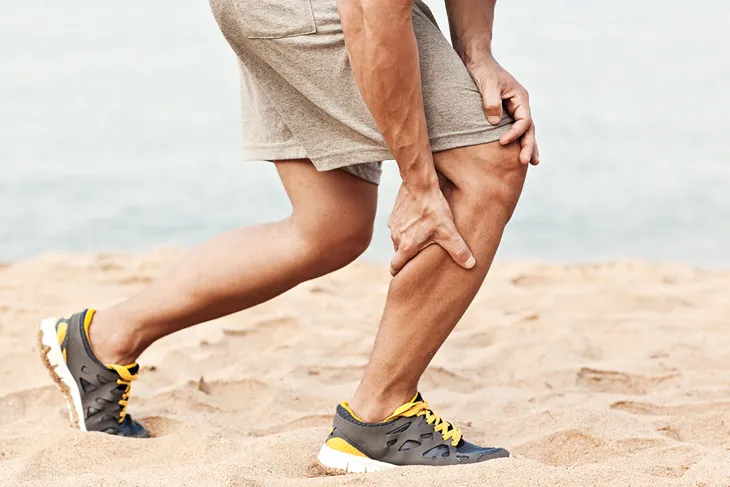
7. Ugh, Constipated!
Water is necessary for efficient digestion, which means water absorption is required for healthy bowel movements. Fluids in your body help things along, including helping the food you eat move smoothly along your intestines and out of the body via bowel movements. Water also keeps the intestinal walls smooth and malleable. That’s why when we’re dehydrated, the colon can become less flexible, contract slower, absorb less water, and result in stool (or body waste) that’s hard, dry, and painful to pass.
Dehydration is a very common culprit of chronic constipation. Inadequate water levels in the body cause the large intestine to suck up water from your food waste, robbing stool of moisture. Keep your digestive system functioning normally and your bowel movements easy to pass by drinking plenty of fluids daily as well as, by eating fiber and getting regular exercise.
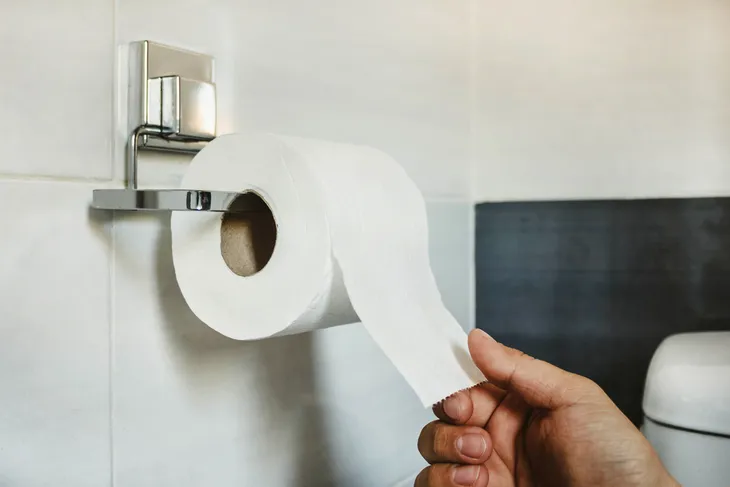
8. Skin Loses Elasticity
Why did you think your doctor pinches your skin to see how fast it bounces back? This quick “pinch test” indicates normal turgor (hydrated skin snaps back to normal quickly) vs. decreased or compromised turgor (dehydrated skin remains elevated and returns to normal slowly). “If it stays tented [or resumes its shape more slowly than usual], that’s a really good sign of being dehydrated,” says Sanford Vieder, DO, Medical Director of Lakes Urgent Care in West Bloomfield and Livonia, Michigan. Hydration is important to keep skin looking young and to prevent sagging.
Oftentimes, your doctor will conduct a quick skin turgor check if he or she suspects dehydration. However, this often occurs with moderate (a body that is 10-percent dehydrated) or severe dehydration (a body that is 20-percent or more dehydrated) when heat stroke or excessive perspiration has already robbed the body of adequate fluids. It’s important to hydrate slowly and immediately.

9. No More Tears
If you’re crying and stop producing tears it’s a good cue that you’re seriously dehydrated. Children who become dehydrated can also cry without tears or produce a lack of wet diapers. It’s typically abnormal for an infant to go 3 or more hours without a wet diaper.
Adults will also notice dry mucous membranes, meaning the nose, mouth, and tongue may become dry and sticky. Along with the absence of tears, dehydration may also cause the eyes to appear sunken. The absence of urination is also a sign of dehydration if you go without a bathroom visit for a period of 4 to 6-hours.
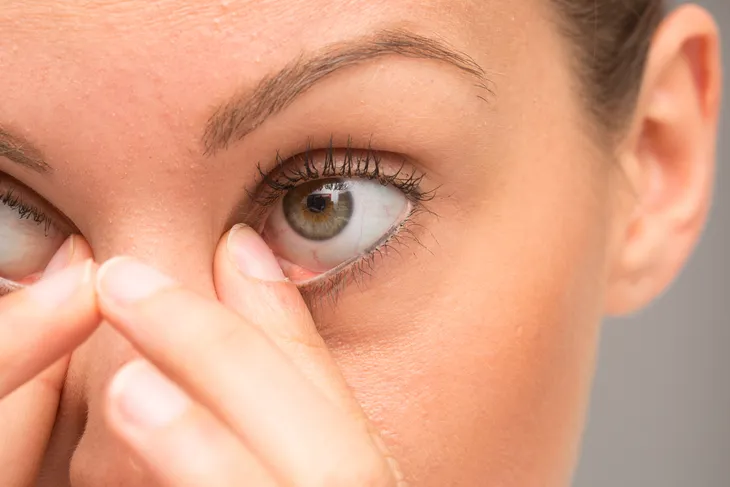
10. You’re Parched
After being outside all day in the heat, you will become incredibly thirsty. It seems all you can think about is water! This is usually one of the first signs of dehydration. When we don’t drink enough water, it affects the body’s electrolytes (the minerals that help signal our body’s metabolic processes). “When your body is short on liquids, your kidneys, the organs responsible for moderating blood and urine volume, cry out for help. In response, the brain’s hypothalamus triggers the thirst response, which leads you to fill your glass and solve your kidneys problems,” writes Cosmopolitan.
Thirst sends confusing signals to the body and brain. For instance, you may feel hunger when you are dehydrated, which explains why a University of Washington study indicated that a single glass of water can easily shut down nighttime hunger pangs in almost all cases. However, “dry mouth,” which is a dry, parched, thick feeling in the mouth, can signal late stage dehydration.
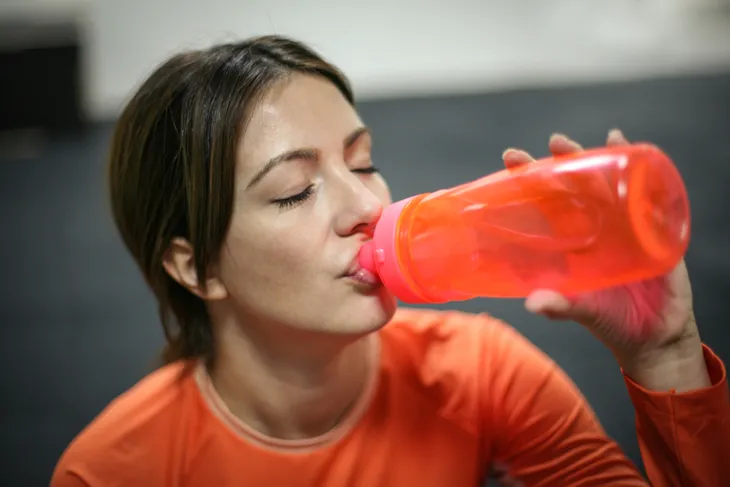
11. Dry Mouth and Lips
This one seems obvious enough, considering dehydration happens when you’re not drinking enough fluids, which in turn would obviously cause a dry mouth. According to the Mayo Clinic, this sign is more common in babies and toddlers. There’s no complex explanation behind this symptom. It simply happens because saliva production decreases when the body doesn’t consume enough liquids, which not surprisingly leads to a dry mouth. This is also why many people who are dehydrated develop bad breath, but we will cover that later.
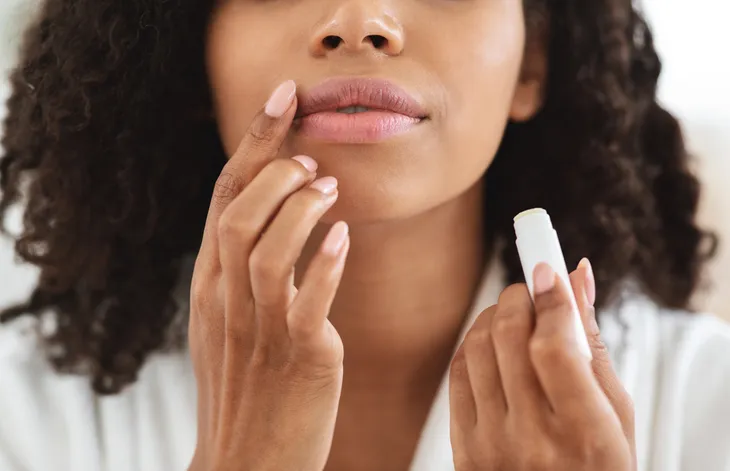
12. Headache
It’s still unclear why dehydration can cause a splitting headache, but the most logical explanation behind it is because our brain, nerves, and sinuses, which are all possible causes of headaches, rely on water as their fuel to properly function. “When electrolyte levels suddenly shift, the body can’t always compensate,” says Christopher McStay, MD, to Cosmopolitan.
Another explanation presented by Self magazine is that headaches occur during dehydration because blood volume drops, which leads to a lack of oxygen to the brain. “This reduces the brain’s oxygen supply and causes the blood vessels to dilate, leading to headaches and even lightheadedness,” says the source.
13. Dry Skin
Earlier in this slideshow, we talked about how dehydration affects the skin’s elasticity. Water is essential for healthy skin, and when we don’t get enough of it, it shows. This is why people recommend drinking lots of water for healthy skin. When we don’t, our skin becomes dry, because the body is using any water we do have for other basic functions. Since our skin doesn’t need water to survive, it’s one of the first organs to lose its supply.
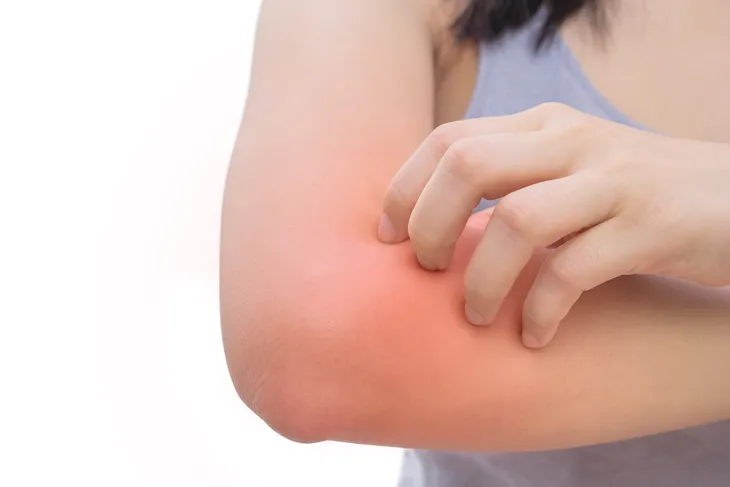
14. Strange Food Cravings
Self talked to Jennifer Wider, MD, who explained why people who are dehydrated get strange cravings (usually for something sweet). It’s because the liver needs water to function. When the liver isn’t receiving the fuel it needs to function, it sends a signal to the brain to find fuel. This causes a bit of confusion, because it usually ends up with the brain thinking it’s hungry, which is why you develop food cravings.
Kim Larson, RDN, sports dietitian and spokesperson for the Academy of Nutrition and Dietetics, who spoke to Reader’s Digest explained that, after a strenuous workout, our glycogen stores are depleted. “Glycogen is a form of stored carbohydrates that our body uses as fuel; the cravings are just our bodies telling us we need more of it and is one of the signs of dehydration,” writes Reader’s Digest.
15. You Have Bad Breath
Dr. Wider also said that dehydration causes bad breath because saliva has bacteria fighting properties. When there’s not enough saliva in the mouth to wash away bacteria, it creates a breeding ground for odor causing germs. All those little bits of food aren’t washed away, which allows bacteria to grow and thrive in the mouth causing bad breath. If you notice your breath isn’t exactly minty fresh, Self magazine advises drinking water more regularly to help clear it up.
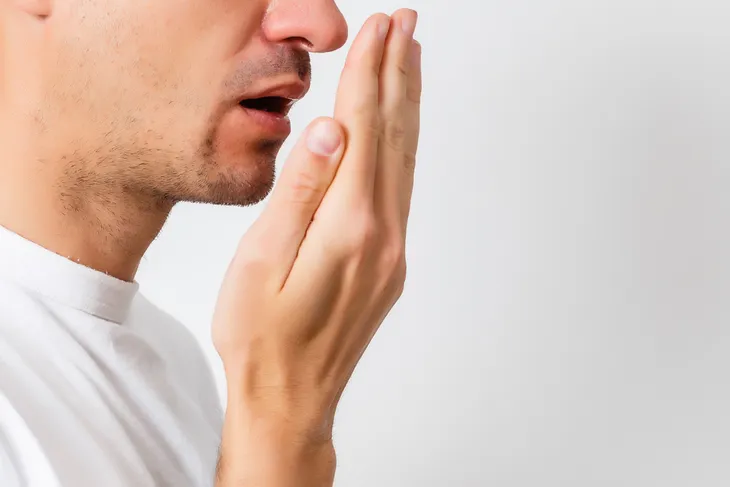
16. You Feel Drunk
Feeling a little loopy, or confused and irritated? Being dehydrated can cause people to feel a little bit like they’re drunk, but you haven’t been drinking…anything. Dehydration can lead to low blood pressure, which results in a lack of oxygen flowing to the brain. In fact, research from a study published in Physiology and Behavior looked at the driving skills of people who were dehydrated and found that it could be just as dangerous as driving while intoxicated. This is because dehydration “causes fatigue and affects our cognitive abilities, like clear thinking and reaction time,” writes Reader’s Digest after talking to Kim Larson, RDN.
The best cure for dehydration is to start drinking water. The easiest way to tell if it’s working is to check the color of your urine. After loading up on liquids, the color should revert back to normal and become clear again. If drinking water doesn’t help ease the symptoms, then you should call your doctor right away, especially if there are other symptoms (including the ones above, as well as vomiting and/or diarrhea).
 For more relevant articles, check out:
For more relevant articles, check out:
